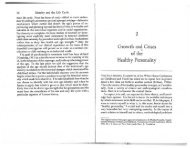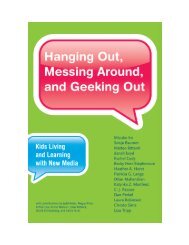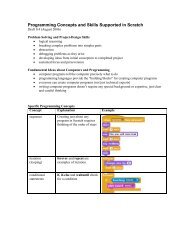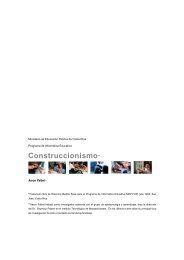Gaming Literacies: A Game Design Study in Action - MIT
Gaming Literacies: A Game Design Study in Action - MIT
Gaming Literacies: A Game Design Study in Action - MIT
Create successful ePaper yourself
Turn your PDF publications into a flip-book with our unique Google optimized e-Paper software.
<strong>Gam<strong>in</strong>g</strong> <strong>Literacies</strong>: A <strong>Game</strong> <strong>Design</strong> <strong>Study</strong> <strong>in</strong> <strong>Action</strong> 319<br />
dynamic system. In the rudimentary test<strong>in</strong>g we did with the <strong>in</strong>itial <strong>Game</strong>star<br />
Mechanic prototype, we observed kids th<strong>in</strong>k<strong>in</strong>g and speak<strong>in</strong>g as designers<br />
of systems. We saw them able to articulate a set of rules that gave their system<br />
mean<strong>in</strong>g and we watched as they shared their knowledge of this system<br />
by successfully play<strong>in</strong>g and review<strong>in</strong>g each other’s games. Perhaps most importantly<br />
we witnessed their com<strong>in</strong>g to an understand<strong>in</strong>g of a design system<br />
and <strong>in</strong>stantiat<strong>in</strong>g this understand<strong>in</strong>g through the creation of fun, playable,<br />
and <strong>in</strong>ventive games.<br />
Educators and education advocates have recently acknowledged that<br />
the ability to th<strong>in</strong>k systemically is one of the necessary skills for success <strong>in</strong><br />
the 21 st century. We believe that game-mak<strong>in</strong>g is especially well-suited to<br />
encourag<strong>in</strong>g meta-level reflection on the skills and processes that designerplayers<br />
use <strong>in</strong> build<strong>in</strong>g such systems, be they games or communities of practice.<br />
Membership <strong>in</strong> a community of game producers means shar<strong>in</strong>g your<br />
thoughts and experiences with your fellow players. This ability to ga<strong>in</strong> fluency<br />
<strong>in</strong> specialist language and to translate th<strong>in</strong>k<strong>in</strong>g and talk<strong>in</strong>g about games<br />
<strong>in</strong>to mak<strong>in</strong>g and critiqu<strong>in</strong>g them (and vice versa) suggests that games not<br />
only teach literacy skills but support their ongo<strong>in</strong>g use. Rather than imag<strong>in</strong><strong>in</strong>g<br />
that education can be transformed by br<strong>in</strong>g<strong>in</strong>g games <strong>in</strong>to the classroom,<br />
researchers should consider not only the effects of the th<strong>in</strong>k<strong>in</strong>g engendered<br />
by those who play, but also by those who design the play.<br />
There are additional implications as well. As a learn<strong>in</strong>g system, <strong>Game</strong>star<br />
Mechanic encourages risk-tak<strong>in</strong>g and learn<strong>in</strong>g <strong>in</strong> a low-risk sett<strong>in</strong>g.<br />
Learners can dive <strong>in</strong> first and learn through critical experimentation, develop<strong>in</strong>g<br />
hypotheses about how th<strong>in</strong>gs work and test<strong>in</strong>g out these theories with<strong>in</strong><br />
an iterative framework. They don’t have to “play for keeps” until they are<br />
ready, and can rely a little or a lot on the expertise of peers with<strong>in</strong> the community<br />
of developers. Each kid <strong>in</strong> our test group went about their design a<br />
bit differently, yet all saved and shared their games with immense pride and<br />
almost no prompt<strong>in</strong>g to do so. Such an attitude should mean a great deal to<br />
those <strong>in</strong>vested <strong>in</strong> shap<strong>in</strong>g the future of education. Agency and a sense of affiliation<br />
are most certa<strong>in</strong>ly two of those most difficult th<strong>in</strong>gs to achieve, with<br />
or without the lure of games.<br />
In clos<strong>in</strong>g, I am rem<strong>in</strong>ded of someth<strong>in</strong>g the writer Jonathan Letham<br />
(2007) wrote <strong>in</strong> regard to the discovery of ideas and the importance of f<strong>in</strong>d<strong>in</strong>g<br />
orig<strong>in</strong>ality and creativity through build<strong>in</strong>g on exist<strong>in</strong>g knowledge. He<br />
talks about the idea of “undiscovered public knowledge,” co<strong>in</strong>ed by Don<br />
Swanson, a library scientist at the University of Chicago. Swanson showed<br />
that stand<strong>in</strong>g problems <strong>in</strong> medical research might be significantly addressed,<br />
perhaps even solved, simply by systematically survey<strong>in</strong>g the scientific litera-







